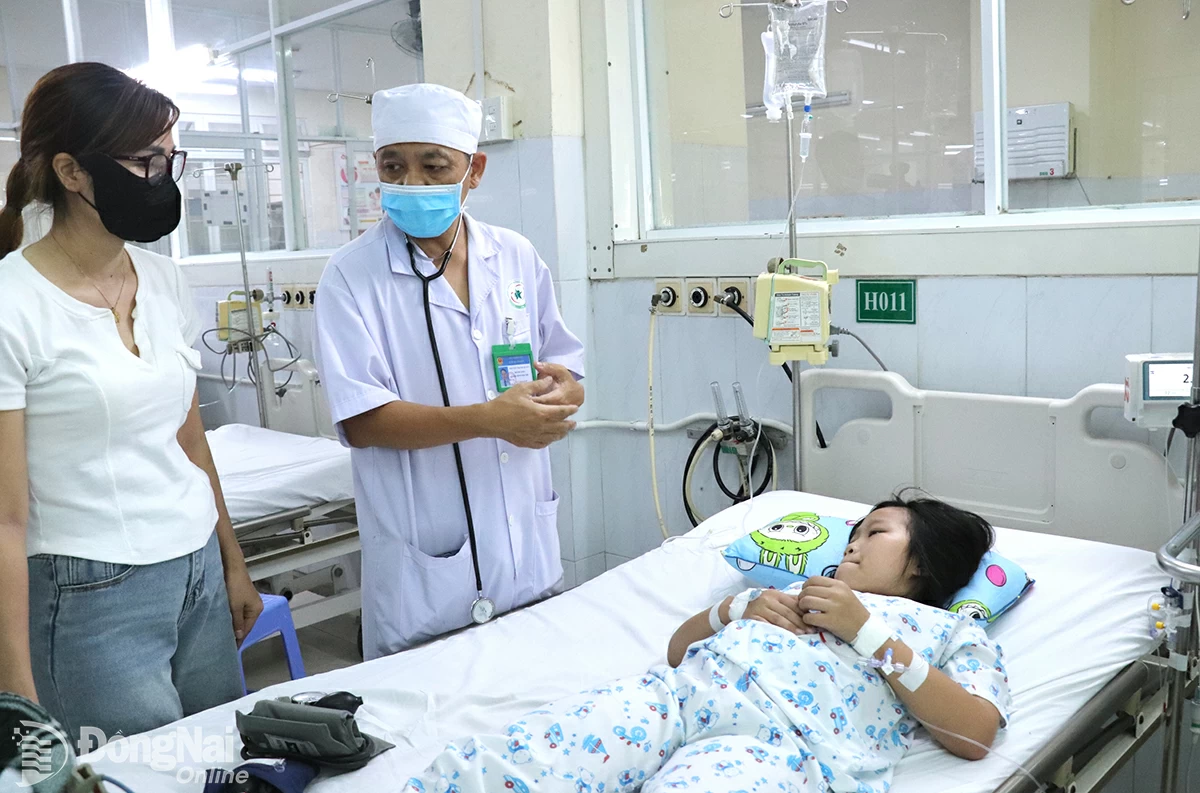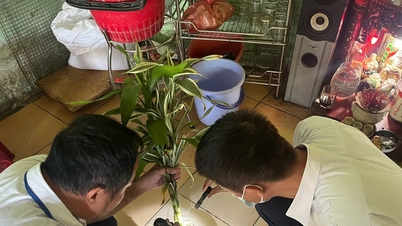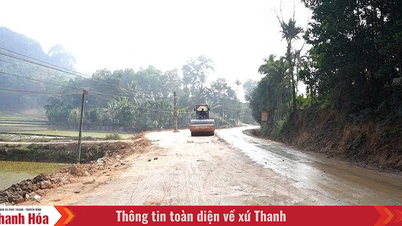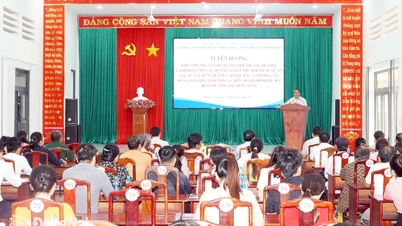 |
| Doctor Nguyen Thanh Quyen, Head of the Department of Tropical Diseases, Dong Nai Children's Hospital, examines a case of dengue fever patient in shock. Photo: Hai Yen |
Many parents are subjective when their children have a fever, only taking them to the doctor when their symptoms become severe.
Many children suffer from dengue shock syndrome.
Pham Hai Yen (9 years old, living in Phuoc Tan ward) had a stomachache and vomited for 2 days but had no fever. On the 3rd day, she started to have a fever and continued to have a stomachache and vomit a lot. On the 4th day, seeing that her child's condition did not improve, Ms. Tran Thi Kim Ngan (Hai Yen's mother) took her child to Dong Nai Children's Hospital for examination. Tests confirmed that the child had dengue fever, so she had to be hospitalized for treatment at the Tropical Diseases Department.
Ms. Ngan said: Before that, Hai Yen's older sister also had dengue fever but it was less severe so she did not have to be hospitalized. She did not think that her child had dengue fever because for the first 2 days, she only had a stomachache and vomited but no fever. When she was hospitalized, she went into shock and had to be taken to the department's emergency room for IV fluids and close monitoring.
Also having a child in the Emergency Room of the Tropical Diseases Department, Mr. Le Anh Dung (residing in Long Phuoc commune) said that his son had a fever and was given fever-reducing medicine, but it did not improve. When the child had a fever for the third consecutive day, he and his wife took him to Dong Nai Children's Hospital for examination and treatment. At this time, the child was very tired, had low blood pressure, and was in shock, so he was taken to the emergency room of the department.
According to statistics from the Provincial Center for Disease Control from July 25 to 31, the whole province recorded 609 cases of hospitalization due to dengue fever, including 240 cases of children (aged 15 and under), accounting for more than 39%. In total, since the beginning of the year, the whole province has had more than 9,000 cases of dengue fever. Of which, the total number of dengue fever cases in children is more than 4,100 cases, accounting for nearly 46%.
According to Dr. Nguyen Thanh Quyen, Head of the Department of Tropical Diseases, Dong Nai Children's Hospital, since the beginning of June, the number of dengue fever cases requiring hospitalization has increased and there have been cases of shock. In July, the number of children hospitalized due to dengue fever increased even more. On average, there are about 50-60 dengue fever cases treated as inpatients at the hospital each day. Notably, the number of children suffering from shock has also increased, with some days having 15-19 children suffering from shock. Most of the children hospitalized for dengue fever treatment have not been vaccinated against dengue fever.
Most of the children admitted to the hospital had a fever that had not subsided for 2-3 days, so their parents took them to see a doctor. Children who had to be hospitalized were all in a state of very high fever. Depending on the child's condition, the Department of Tropical Diseases will arrange the children in appropriate rooms. In particular, children showing signs of pre-shock will be placed near the emergency room for closer monitoring and timely treatment. Children in shock will be taken to the department's emergency room, treated according to the shock protocol and closely monitored for 24 hours. When the child gradually stabilizes, the IV will be stopped and transferred to the next room for further monitoring.
Dr. Quyen said: Overweight and obese children often have a higher rate of shock. In these cases, doctors will consider, consult and treat according to a separate protocol to limit fluid overload as well as limit respiratory failure.
Children should be vaccinated against dengue fever.
In fact, in many cases, when children have dengue fever, parents mistakenly think that their children have a viral fever and do not take them to the doctor. This can be dangerous if the child goes into shock at home and is not taken to the emergency room in time.
According to Dr. Quyen, if the child has a viral fever, the fever usually lasts for 2-3 days, then the fever goes down, at this time the child will be healthier, less tired, and able to eat; parents can leave the child at home and monitor. On the contrary, if the child's fever goes down but he/she is lethargic, vomits and has more abdominal pain, it is necessary to think of the situation that the child has dengue fever and take him/her to the doctor immediately. Because this is a dangerous stage of the disease, the child may be about to go into shock. There are many cases where the child has just been admitted to the hospital and then goes into shock a few hours later.
Signs of dengue shock in children: the child is more tired, cannot eat or drink, the limbs are not warm, the pulse is not felt or is difficult to feel, the child does not urinate... If the child is shocked at home and is not taken to a medical facility in time, emergency treatment will be very difficult, even requiring a ventilator, blood filtration...
Currently, dengue fever is on the rise. When a child has a fever for 2 days or more, parents must take the child to the doctor for testing to determine whether the child has dengue fever or not in order to treat it promptly.
Doctor Nguyen Thanh Quyen recommends: All children over 4 years old, if possible, parents should give them 2 doses of dengue vaccine, each dose 3 months apart. The protection will be at its maximum after the second dose. Normally, if vaccinated, the rate of hospitalization for dengue treatment is very low (about 90% of children do not have to be hospitalized). After vaccination, if children get dengue, it is mild and about 80% of them have no symptoms, only a transient fever and no fatigue.
Children who have had dengue fever should still be vaccinated, because the dengue vaccine can prevent all four types of dengue fever. In this case, the child should be vaccinated 6 months after the illness.
Hai Yen
Source: https://baodongnai.com.vn/xa-hoi/202508/khong-chu-quan-lo-la-khi-tre-bi-sot-xuat-huyet-5e51d02/



![[Photo] Prime Minister Pham Minh Chinh receives Lao Minister of Labor and Welfare Phosay Sayasone](https://vphoto.vietnam.vn/thumb/1200x675/vietnam/resource/IMAGE/2025/11/11/1762872028311_dsc-2246-jpg.webp)


![[Photo] Chu Noodles - the essence of rice and sunshine](https://vphoto.vietnam.vn/thumb/1200x675/vietnam/resource/IMAGE/2025/11/11/1762846220477_ndo_tl_7-jpg.webp)






























































































![Dong Nai OCOP transition: [Article 3] Linking tourism with OCOP product consumption](https://vphoto.vietnam.vn/thumb/402x226/vietnam/resource/IMAGE/2025/11/10/1762739199309_1324-2740-7_n-162543_981.jpeg)








Comment (0)